Championships


- 1939, 1947 – Allan Cup champions
- 1945, 1946, 1947 – Quebec Senior Hockey League
- 1949 – Memorial Cup champions
- 1959 – Quebec Hockey League
The Royal Montreal Hockey Club, also known as the Montreal Royals, was a Canadian amateur ice hockey club formed in Montreal, Quebec, in 1932. [1] It operated various teams in men's junior and senior leagues until 1961. The senior team of the club won the Allan Cup men's championship in 1939 and 1947, and the junior team of 1949 won the Memorial Cup junior men's Canadian championship.
The hockey club was founded in 1932, operated by E. S. Hamilton and G. T. Ogilvie. [2] [3] Formed from the Montreal Hockey Club, the senior Royals played in the Quebec Amateur Hockey Association play from 1932–1933, in the Quebec Senior Hockey League from 1944–1953, the Quebec Hockey League from 1953–1959, and the Eastern Professional Hockey League from 1959–1961. The senior Royals won the QSHL championship in 1945 and 1946, and the QHL championship in 1959. The senior Royals won the Allan Cup in 1947.
The junior Royals played in the Quebec Junior Hockey League. The Junior team reached the eastern Canadian championship five times, winning in 1941 and 1949, and finished runners-up in 1933, 1944 and 1945. The junior Royals won the Memorial Cup in 1949, and were finalists in 1941.
When the Royals advanced to the 1941 Memorial Cup semifinals, Quebec Amateur Hockey Association president Norman Dawe lobbied for games to be played at the Montreal Forum instead of all games in Toronto. [4] The Canadian Amateur Hockey Association voted against his request due to budget constraints and travel costs. [5] In the 1941 Memorial Cup final, the Montreal Royals won both games played on home ice, but failed to win the cup when they lost all three games played in Toronto. [6] In the 1942 Memorial Cup playoffs, the Montreal Royals defeated the Halifax Junior Canadians by a 12–3 score in the first game of a best-of-three series at Montreal Forum. The remainder of series was cancelled due to poor attendance and gate receipts. [7]


Season-by-season results for the Montreal Royals senior hockey team.
| Season | Games | Won | Lost | Tied | Points | Pct % | Goals for | Goals against |
|---|---|---|---|---|---|---|---|---|
| 1935–36 | 22 | 14 | 4 | 4 | 36† | 0.778 | 93 | 61 |
| 1936–37 | 22 | 17 | 3 | 2 | 36† | 0.850 | 99 | 51 |
| 1937–38 | 22 | 8 | 11 | 3 | 22† | 0.420 | 61 | 63 |
| 1938–39 | 22 | 12 | 4 | 6 | 34† | 0.750 | 76 | 51 |
| 1939–40 | 30 | 13 | 8 | 9 | 35 | 0.619 | 119 | 91 |
| 1940–41 | 35 | 21 | 12 | 2 | 44 | 0.636 | 151 | 113 |
| 1942–43 | 34 | 11 | 18 | 5 | 27 | 0.379 | 114 | 145 |
| 1943–44 | 15 | 7 | 6 | 2 | 22† | 0.538 | 80 | 76 |
| 1944–45 | 24 | 18 | 5 | 1 | 37 | 0.771 | 161 | 98 |
| 1945–46 | 40 | 30 | 8 | 2 | 62 | 0.775 | 209 | 131 |
| 1946–47 | 40 | 25 | 13 | 2 | 52 | 0.650 | 173 | 124 |
| 1947–48 | 48 | 34 | 14 | 0 | 68 | 0.708 | 241 | 159 |
| 1948–49 | 59 | 35 | 19 | 5 | 77 | 0.636 | 216 | 178 |
| 1949–50 | 60 | 27 | 24 | 9 | 63 | 0.525 | 206 | 188 |
| 1950–51 | 60 | 28 | 29 | 3 | 59 | 0.492 | 200 | 203 |
| 1951–52 | 60 | 30 | 24 | 6 | 66 | 0.550 | 219 | 204 |
| 1952–53 | 60 | 32 | 22 | 6 | 70 | 0.583 | 201 | 162 |
| 1953–54 | 72 | 40 | 25 | 7 | 87 | 0.604 | 257 | 203 |
| 1954–55 | 62 | 30 | 28 | 4 | 63 | 0.516 | 232 | 207 |
| 1955–56 | 64 | 34 | 23 | 7 | 75 | 0.586 | 192 | 162 |
| 1956–57 | 68 | 28 | 34 | 6 | 62 | 0.456 | 191 | 211 |
| 1957–58 | 64 | 29 | 30 | 5 | 63 | 0.492 | 227 | 219 |
| 1958–59 | 62 | 34 | 22 | 6 | 74 | 0.597 | 206 | 162 |
| 1959–60 | 70 | 30 | 26 | 14 | 74 | 0.529 | 215 | 198 |
| 1960–61 | 70 | 19 | 37 | 14 | 52 | 0.371 | 167 | 224 |
† Team played some four-point games against McGill Source: 1935–38: Ottawa Citizen , 1942–43: Ottawa Citizen, [11] 1943–44: Ottawa Citizen [12]

Montreal Amateur Athletic Association is Canada's oldest athletic association, located in Montreal, Quebec. It was renamed as the Club Sportif MAA or just MAA in 1999 after a brush with bankruptcy, but is still widely known as the MAAA. In the late 19th and early 20th centuries, the MAA was one of the most important sporting institutions in Canada, and North America, with affiliated teams winning ice hockey's Stanley Cup and Canadian football's Grey Cup.
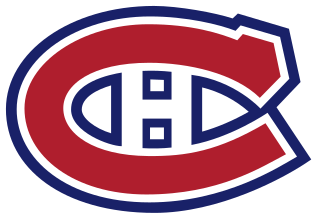
The Montreal Junior Canadiens were a junior ice hockey team in the Quebec Junior Hockey League from 1933 to 1961, and the Ontario Hockey Association from 1961 to 1972. They played out of the Montreal Forum in Montreal, Quebec, Canada.
Edward Charles John "Eddie" Litzenberger was a Canadian ice hockey right winger from Neudorf, Saskatchewan. Litzenberger was "donated" to the Chicago Black Hawks by the Montreal Canadiens in his first year in the National Hockey League (NHL). At the time the Black Hawks were struggling to survive as a franchise, and the league governors decided to help the team remain viable.
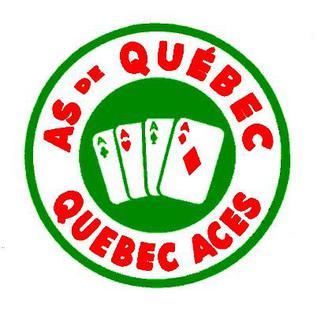
The Quebec Aces, also known in French as Les As de Québec, were an amateur and later a professional men's ice hockey team from Quebec City, Quebec.

Hockey Québec is the governing body of all ice hockey in Quebec, Canada. Hockey Québec is a branch of Hockey Canada.
The Quebec Senior Hockey League (QSHL) was an ice hockey league that operated from 1941 to 1959, based in Quebec, Canada. The league played senior ice hockey under the jurisdiction of the Quebec Amateur Hockey Association until 1953, when it became professional and operated as the Quebec Hockey League (QHL).
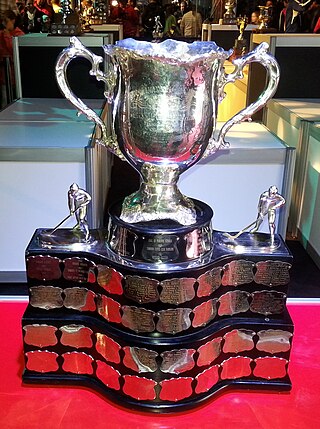
The 1942 Memorial Cup final was the 24th junior ice hockey championship of the Canadian Amateur Hockey Association (CAHA). The George Richardson Memorial Trophy champions Oshawa Generals of the Ontario Hockey Association in Eastern Canada competed against the Abbott Cup champions Portage la Prairie Terriers of the Manitoba Junior Hockey League in Western Canada. In a best-of-five series, held at Shea's Amphitheatre in Winnipeg, Manitoba, Portage la Prairie won their 1st Memorial Cup, defeating Oshawa 3 games to 1.

The 1941 Memorial Cup final was the 23rd junior ice hockey championship of the Canadian Amateur Hockey Association (CAHA). The George Richardson Memorial Trophy champions Montreal Royals of the Quebec Junior Hockey League in Eastern Canada competed against the Abbott Cup champions Winnipeg Rangers of the Manitoba Junior Hockey League in Western Canada. This was the first-ever Memorial Cup to feature a team from Quebec. In a best-of-five series, held at the Montreal Forum in Montreal, Quebec and at Maple Leaf Gardens in Toronto, Ontario, Winnipeg won their 1st Memorial Cup, defeating Montreal 3 games to 2.
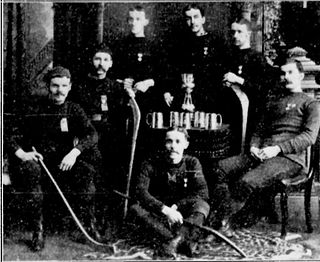
The Montreal Hockey Club of Montreal, Quebec, Canada was a senior-level men's amateur ice hockey club, organized in 1884. They were affiliated with the Montreal Amateur Athletic Association (MAAA) and used the MAAA 'winged wheel' logo. The team was the first to win the Stanley Cup, in 1893, and subsequently refused the cup over a dispute with the Montreal Amateur Athletic Association. The club is variously known as 'Montreals', 'Montreal AAA' and 'Winged wheel' in literature.

The Ottawa Senators, also known as the Ottawa Commandos and Senior Senators, was an amateur, later semi-professional, senior-level men's ice hockey team based in Ottawa, Ontario, Canada. In 1934, the Ottawa Auditorium, owners of the Ottawa Hockey Association decided it could no longer operate the Senators of the National Hockey League in Ottawa due to mounting financial losses. The Association split its hockey operations, relocating the NHL franchise to St. Louis, and continuing the Senators as an amateur club. The club operated from 1934 until 1955, winning the Allan Cup Canadian men's senior ice hockey championship in 1943, 1948 and 1949. During the war years from 1942 until 1944, it operated as the Ottawa Commandos.
The Ottawa City Hockey League (OCHL) was an amateur ice hockey league with junior, intermediate and senior level men's teams in Ottawa, Canada. Founded in 1890 by the local Ottawa Hockey Association, the OCHL was created to organize play within the city of Ottawa. It is considered the second ice hockey league to form in Canada.
In Ottawa, Canada, ice hockey clubs date back to the first decade of recorded organized ice hockey play. The men's senior-level Ottawa Hockey Club is known to have played in a Canadian championship in 1884. Today, Ottawa hockey clubs are represented in all age brackets, in both men's and women's, in amateur and professional.
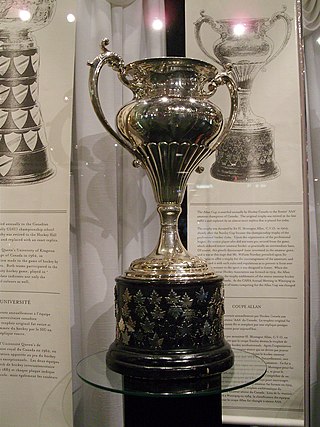
The 1942 Allan Cup was the senior ice hockey championship of the Canadian Amateur Hockey Association for the 1941–42 season. The Ottawa RCAF Flyers defeated the Port Arthur Bearcats by three games to two to win the Allan Cup.
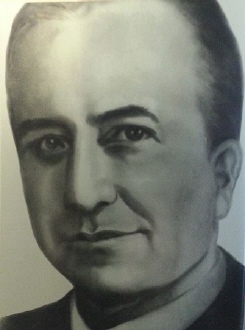
Cecil Charles Duncan was a Canadian ice hockey administrator. He served as president of the Canadian Amateur Hockey Association (CAHA) from 1936 to 1938 and led reforms towards semi-professionalism in ice hockey in Canada. He served as chairman of the CAHA committee which proposed a new definition of amateur to eliminate what it called "shamateurism", in the wake of Canada's struggles in ice hockey at the 1936 Winter Olympics. He negotiated a series of agreements to protect the CAHA's interests, and to develop relationships with all other areas of the world where hockey was played. The agreements allowed the CAHA to become independent of the Amateur Athletic Union of Canada which wanted to keep the old definition of pure amateurism. Duncan's reforms also returned the CAHA to affluence after four years of deficits during the Great Depression and increased player registrations in Canada.

The Maritime Amateur Hockey Association (MAHA) was a governing body for amateur ice hockey in the Maritimes of Canada. It was a branch member of the Canadian Amateur Hockey Association from 1928 to 1974, with its jurisdiction including the provinces of New Brunswick, Nova Scotia and Prince Edward Island. The MAHA operated leagues for senior ice hockey which competed for the Allan Cup, and leagues for junior ice hockey which competed for the Memorial Cup. The New Brunswick Amateur Hockey Association separated from the MAHA in 1968, and the MAHA ceased to exist after the Nova Scotia Hockey Association and Prince Edward Island Hockey Association were established in 1974.
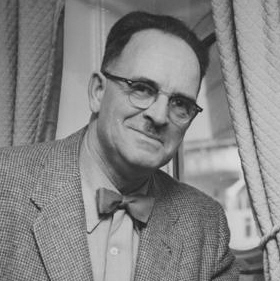
William Bryden George, also known as Baldy George, was a Canadian sports administrator and agriculturalist. He was president of the Canadian Amateur Hockey Association from 1952 to 1955, when Canada debated whether it would withdraw from the Ice Hockey World Championships and the Olympic Games. At issue was the perceived financial exploitation of the Canada men's national ice hockey team and abuse from European media on the Canadian style of physical play. He wanted a financial guarantee for the national team when it travelled since its participation increased attendance at events in Europe. Canada did not participate at the World Championships in 1953 and placed second in 1954, which led to heavy criticism by media in Canada for the failure to win. Although Canada won the 1955 Ice Hockey World Championships, George questioned future participation and was concerned that the game in Europe took on political and religious meanings in which Canada did not want to become involved.

Frank Chapin Greenleaf was a Canadian sports administrator. He served as president of the Canadian Amateur Hockey Association and the Quebec Amateur Hockey Association, and was an executive in the Quebec branch of the Amateur Athletic Union of Canada. He presided over amateur hockey when the Canadian Amateur Hockey Association wanted to end the raiding of its rosters by foreign teams and to prevent a geographic shift in talent by imposing a residency rule for players. Greenleaf negotiated for a North American senior ice hockey championship that saw the Allan Cup winner play the amateur champion of the United States. He served as an executive member of multiple amateur hockey leagues in Montreal and was one of the founders of the Mount Royal Junior Hockey League.

Lionel Fleury was a Canadian ice hockey administrator who served as president of the Canadian Amateur Hockey Association from 1964 to 1966. Under his leadership, the Canada men's national ice hockey team transitioned from student athletes coached by Father David Bauer into a year-round national team program. Fleury welcomed the Newfoundland Amateur Hockey Association as a new branch member of the national association in 1966, and changed the format of the Memorial Cup playoffs in Eastern Canada from an elimination bracket into a round-robin format to reduce travel costs and address concerns of imbalanced competition. He sought an end to the National Hockey League system of sponsoring amateur teams by replacing it with a draft of players who had graduated from junior ice hockey, and negotiated for a new agreement that was realized after his term as president concluded.
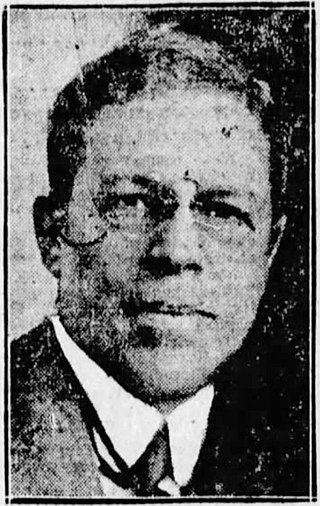
William Rowen Granger was an American-born Canadian sports administrator and businessman. He served as president of the Montreal AAA from 1918 to 1920, oversaw the revival of the association's ice hockey, baseball and soccer teams after World War I, and previously served as president of the Montreal Lawn Bowling Club and the Montreal Bicycle Club. He helped establish the Province of Quebec Lawn Bowling Association and became its president in 1919. He also served as president of the Inter-Club Road Race Association of Montreal, helped organize the Cyclists' Rights Committee in Montreal, and was a director of the Canadian Wheelmen's Association.
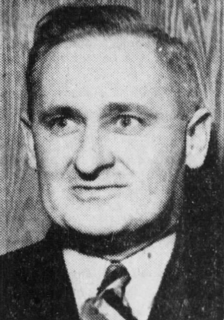
Robert Norman Dawe was a Canadian sports executive. He originated as an ice hockey referee for minor ice hockey games in Verdun, Quebec, before becoming involved in the administrative aspect of sports. He was a member of the local YMCA executive, served as secretary of the Verdun Playgrounds Commission from 1923 to 1948, and organized the Verdun Hockey Board. He served as a member of the Quebec Amateur Hockey Association (QAHA) executive committee for 23 seasons, and helped establish a provincial referee's board in 1936. In Montreal and Verdun, he was involved in girls' fastpitch softball. He served as the Montreal Ladies' Major Softball League president from 1940 to 1945, then was president of the Verdun Ladies' Softball League from 1945 to 1947. He began organizing Canadian football in 1945, when he established the Verdun Juvenile Football League and served as president.